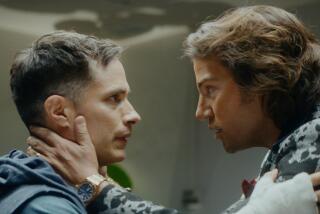Movie review: ‘Even the Rain’
Considering how ambitious it is, how many different narrative strands it employs, the Spanish film “Even the Rain” does a remarkably good job keeping its disparate elements involving and in harmony.
A behind-the-scenes look at the trials of movie-making, a commentary on both recent historic events and those 500 years in the past, as well as a film political enough to be dedicated to the memory of radical historian Howard Zinn, “Even the Rain” is a lot for Spanish director Icíar Bollaín to attempt.
That Zinn dedication comes courtesy of screenwriter Paul Laverty, a friend of the historian’s and best known for having written nine films for the politically involved British director Ken Loach, including such successes as “My Name Is Joe,” “Sweet Sixteen” and “The Wind That Shakes the Barley.”
It was Laverty’s idea to center “Even the Rain” around a Spanish film crew headed by director Sebastián (Gael García Bernal) and producer Costa (Luis Tosar), who arrive in the city of Cochabamba, Bolivia, early in 2000 to shoot a film about Christopher Columbus and the Spanish invasion of the New World.
As played by García Bernal, Sebastián is a sensitive, idealistic filmmaker whose idea is to highlight how Columbus’ lust for gold led to atrocities against the native populations, atrocities condemned a few years later by the Dominican friar Bartolomé de las Casas, also a character in the story.
A baby auteur who believes “the film comes first, always,” Sebastián may be an idealist but he knows when to give way to Costa, his pragmatic, hard-headed producer. Even though Columbus never came anywhere near Bolivia, Costa chooses to shoot there because the country’s poverty makes it a bargain location and, anyway, “all Indians look the same.”
Costa in turn gives way to Sebastián when the director insists on an open call for the Indian roles. Here he discovers Daniel (Bolivian actor Juan Carlos Aduviri), an intense individual he cannot resist casting as Hatuey, the leader of an anti-Spanish rebellion, in part because the actor clearly has a rebellious nature himself.
One of the interesting aspects of Laverty’s script is having Antón (Karra Elejalde), the actor playing Columbus, engage in verbal clashes with Alberto (Carlos Santos), the actor playing De las Casas, over whether the friar was the unalloyed force for good the script insists he was.
All of this is intensified when the real world of Cochabamba collides in an inescapable way with the filmmakers’ plans. As detailed in several documentaries including the recent Sundance film “Flow,” Cochabamba was the place where a multinational consortium tried to privatize the city’s water supply, making it prohibitively expensive for most of the residents.
Fed up with rules that would forbid anyone from collecting “even the rain that falls on us,” the people of Cochabamba rebelled against this water privatization in April 2000. What “Even the Rain” adroitly does is link the fictional Columbus film with the real-life modern revolt by turning Daniel into one of its leaders.
This may sound facile, but in fact “Even the Rain” doesn’t play out in expected ways. The potency of the life-and-death water situation adds power to the script’s dramatic situations as well as underline how the self-righteous Columbus crew is blind to its own kind of exploitation.
As the pressures of reality overwhelm the newcomers, their plans change as well as their very characters, and “Even the Rain” allows us to watch that happening. When Daniel says at a key point, “Some things are more important than your film,” he is speaking not only for himself but for the world at large as well.
More to Read
The biggest entertainment stories
Get our big stories about Hollywood, film, television, music, arts, culture and more right in your inbox as soon as they publish.
You may occasionally receive promotional content from the Los Angeles Times.











